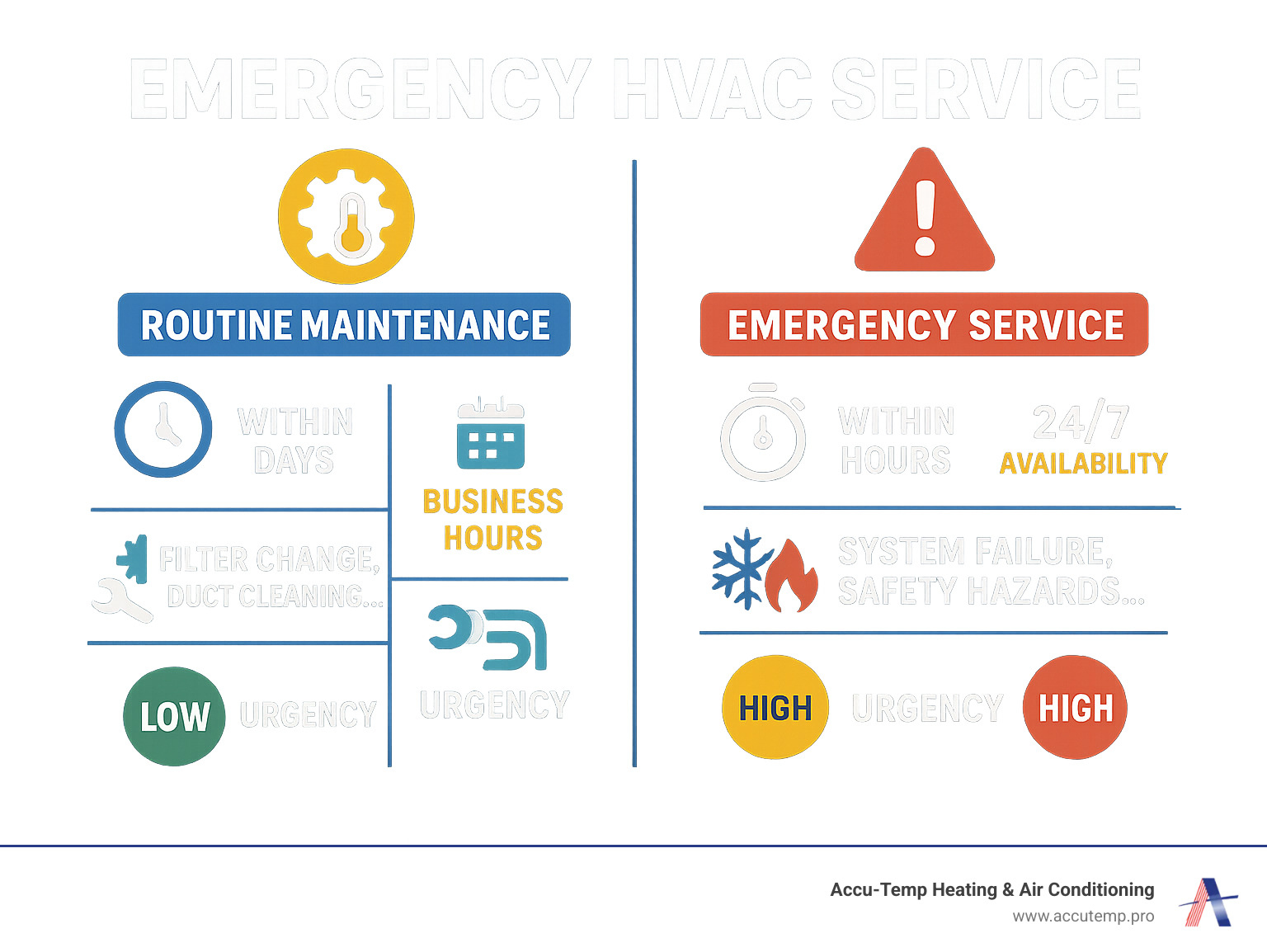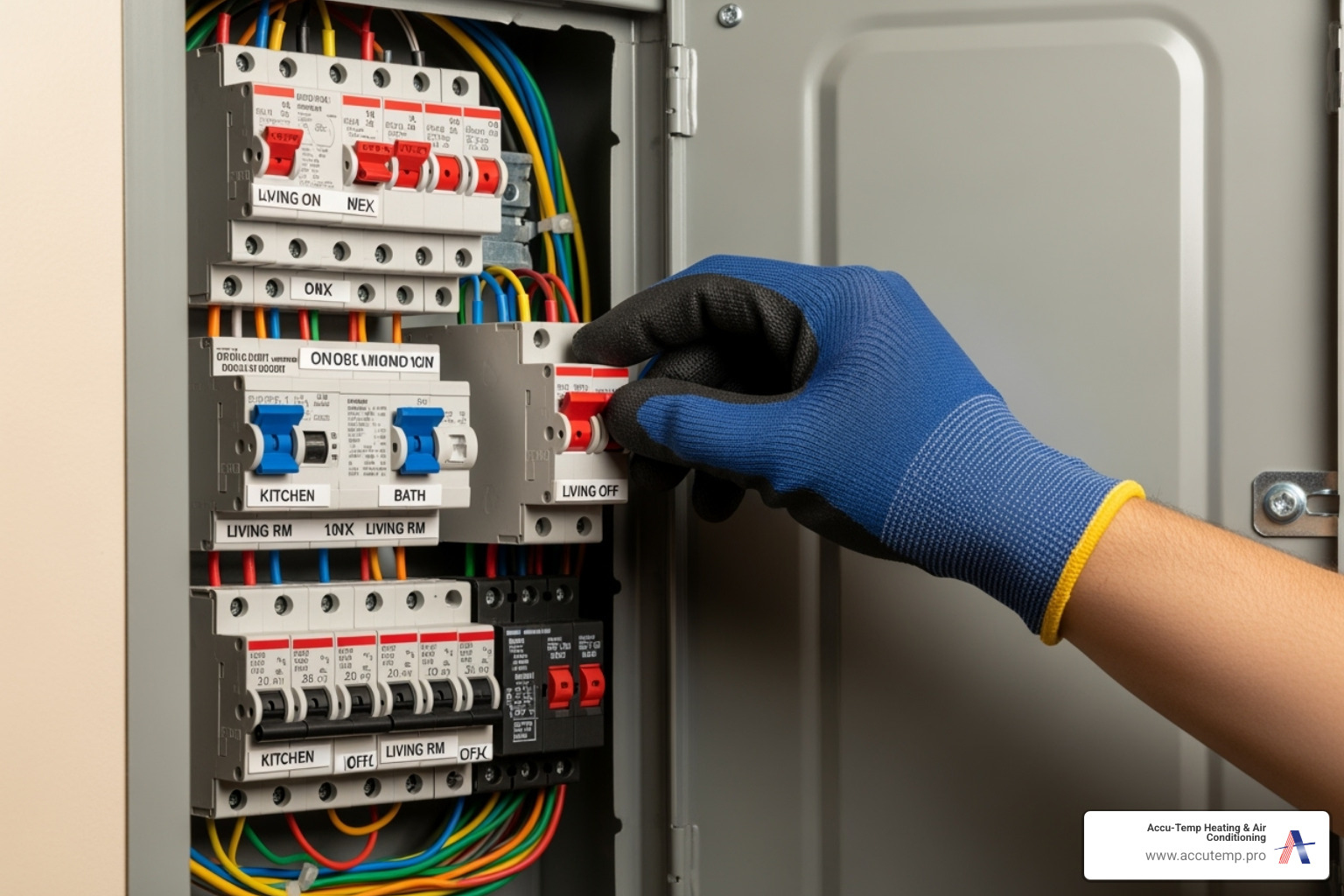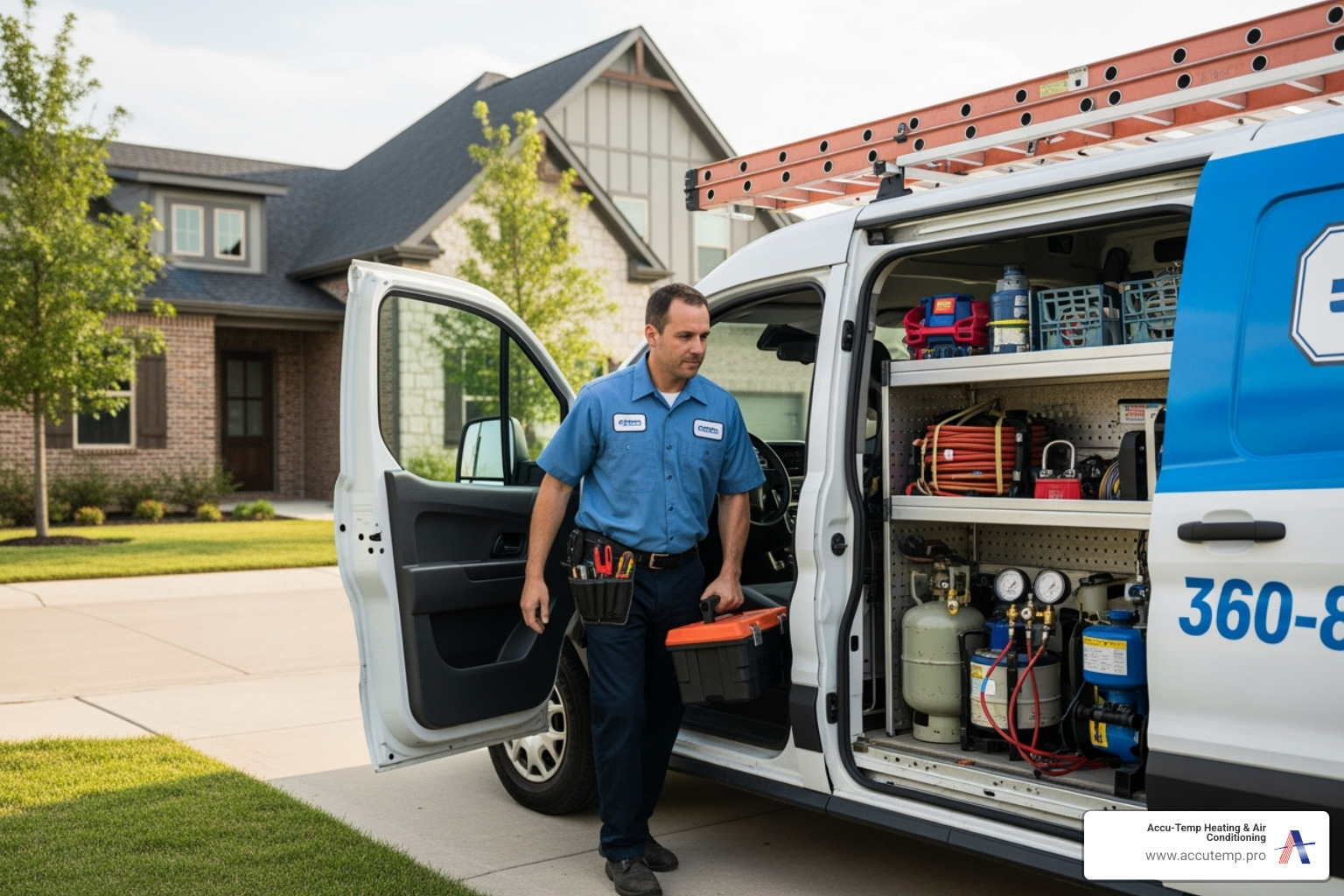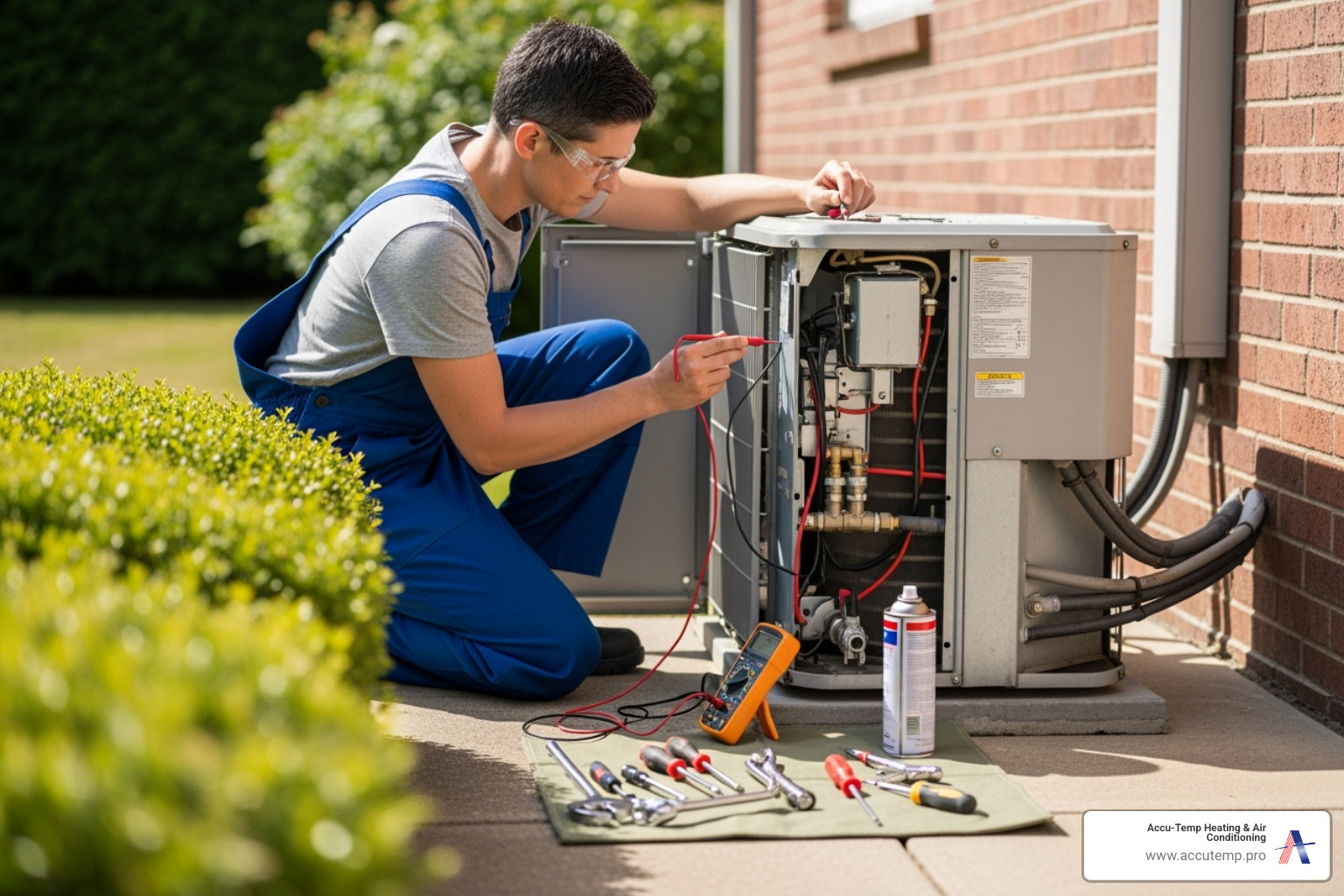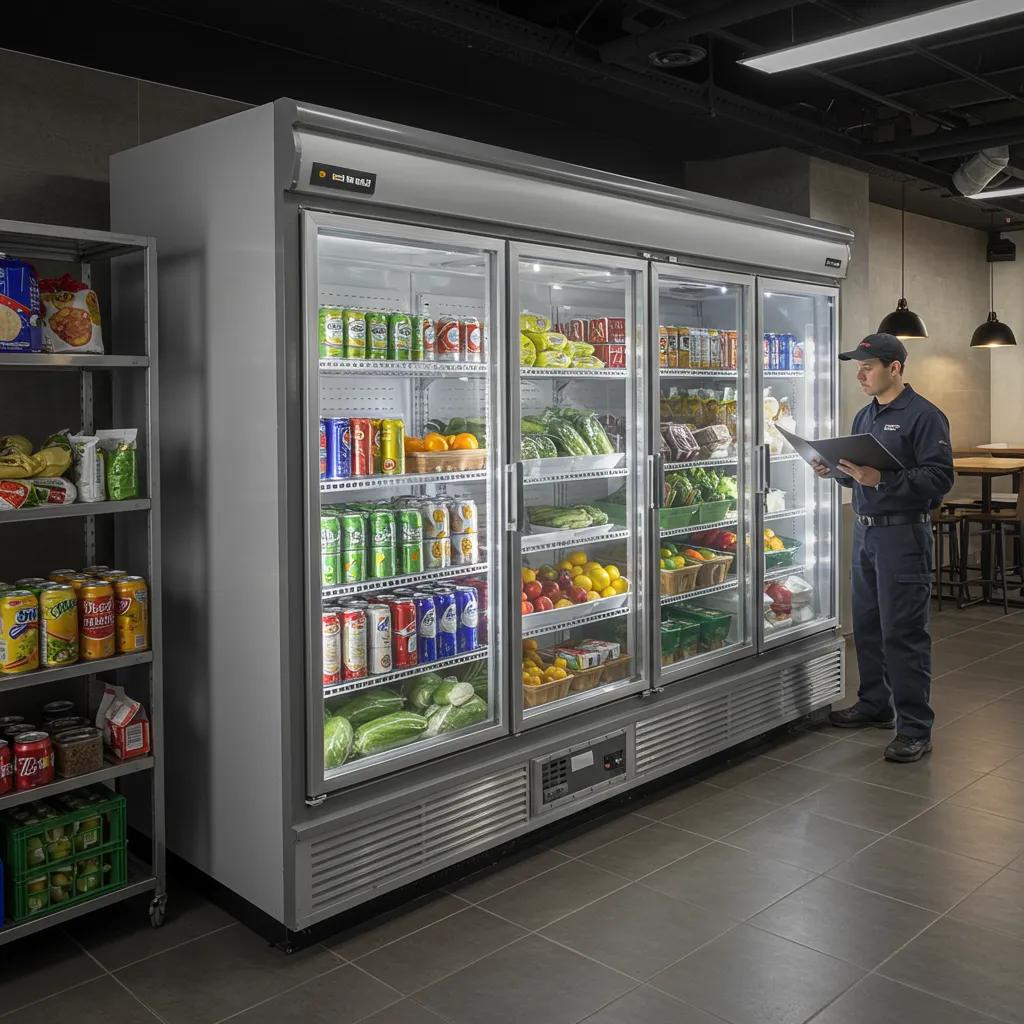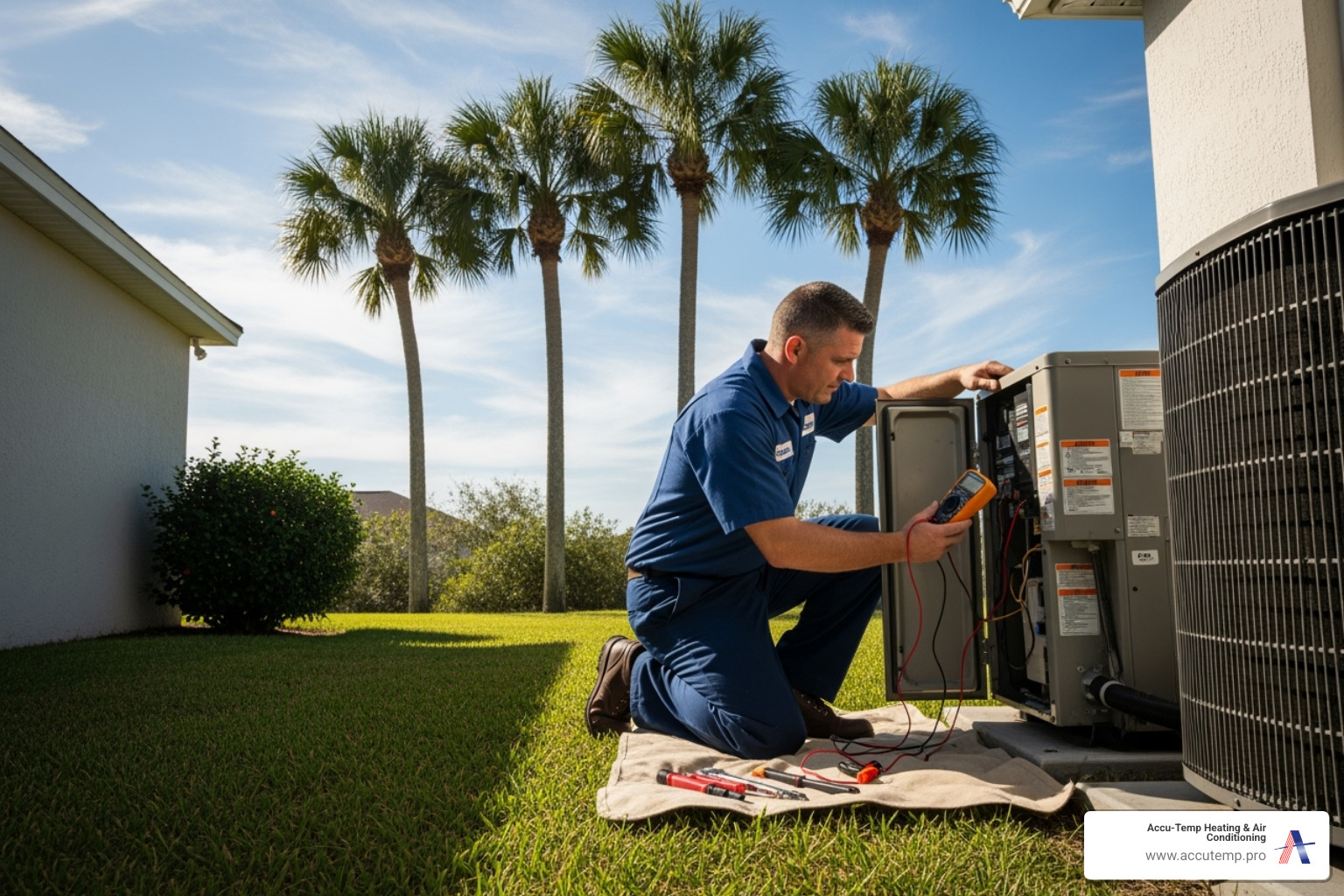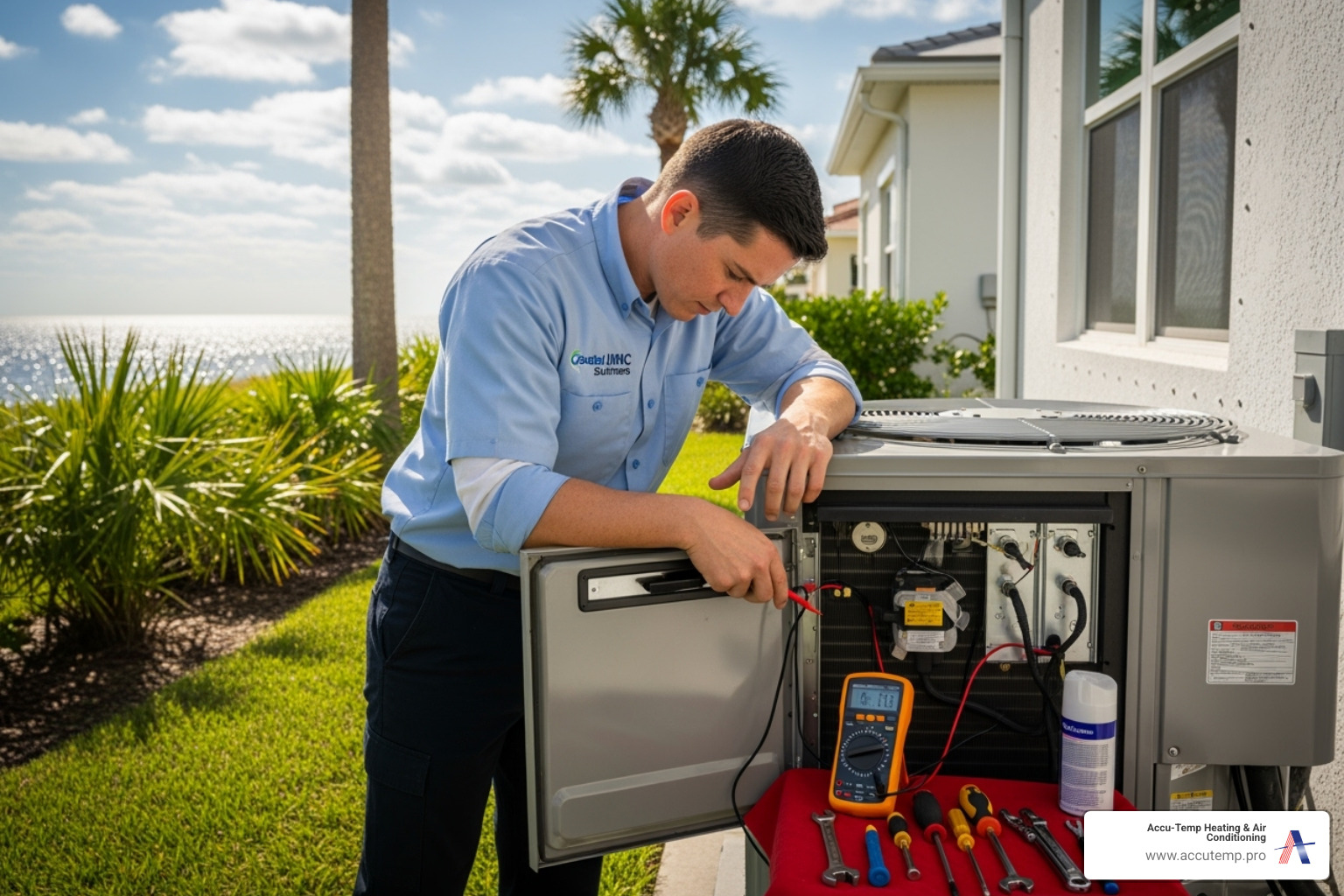What Is an HVAC Emergency and Why It Matters for Florida Homeowners
Emergency HVAC service is required when your heating or cooling system fails unexpectedly, creating immediate threats to your health, safety, or property. In Florida’s extreme climate, these situations demand urgent professional attention, often within hours.
When Do You Need Emergency HVAC Service?
- Complete system failure during extreme weather (no AC in summer, no heat in winter)
- Safety hazards like gas leaks, burning smells, or electrical sparks
- Major water leaks causing property damage
- Strange, loud noises like grinding, screeching, or banging
- Poor indoor air quality with unusual odors or visible smoke
An HVAC emergency differs from a minor repair because it poses immediate risks. In Florida, a broken air conditioner during a heatwave can lead to heat exhaustion or heat stroke, especially for children and the elderly. Likewise, a heating failure during a cold snap can create dangerous indoor conditions.
For businesses, an HVAC emergency can be costly, leading to lost time, money, and customers. Restaurants, retail stores, and offices cannot operate safely without proper climate control.
The key difference between emergency and routine service is timing and urgency. Emergency services operate 24/7, dispatch technicians immediately, and focus on restoring your system’s basic function as quickly as possible.
What Constitutes an HVAC Emergency?
An HVAC emergency is any malfunction that poses an immediate risk to health and safety, or threatens significant property damage or business disruption. It’s about critical safety, not just comfort.
Here’s a closer look at what constitutes an emergency:
- System Failure in Extreme Weather: In Florida, this usually means your AC stops working on a scorching summer day. Temperatures above 90°F can quickly make a home dangerous, especially for vulnerable individuals. A furnace breakdown during a cold snap can also lead to unsafe indoor temperatures.
- Safety Risks: This is the most critical category. Gas leaks, electrical hazards, or carbon monoxide leaks are life-threatening situations requiring immediate action.
- Gas Leaks: A rotten egg smell indicates a natural gas leak. Evacuate immediately and call for emergency help from a safe location.
- Electrical Hazards: Burning smells, sparks, or frequently tripping breakers linked to your HVAC unit signal a fire risk.
- Major Water Leaks: Significant water pooling around your unit can cause extensive property damage, mold growth, and electrical shorts.
- Business Operation Disruption: For commercial properties, an HVAC failure can halt operations. A restaurant without AC in July or an overheating data center directly impacts revenue and productivity.
How Emergency HVAC Services Differ from Routine Calls
Understanding the difference helps you know when to make that urgent call:
- 24/7 Availability: Emergency services are available around the clock, 365 days a year, including nights, weekends, and holidays.
- Immediate Dispatch: When you call for an emergency, qualified technicians are dispatched as quickly as possible to diagnose and begin repairs.
- Focus on Urgent Restoration: The primary goal is to restore basic function and safety. While a complete, long-term solution might require a follow-up visit, the immediate priority is to resolve the crisis.
- Specialized Expertise: Emergency technicians are skilled in diagnosing and fixing critical failures under pressure, often on the first visit.
Recognizing the Red Flags: Signs You Need Immediate HVAC Help
Knowing when you need emergency HVAC service can prevent a minor annoyance from escalating into a dangerous situation or a complete system breakdown. Most HVAC emergencies result from neglected maintenance, electrical issues, or mechanical wear and tear. Your system will often provide clues that something is wrong. Learning to recognize these warning signs allows you to act quickly and keep your family safe.
Critical Safety Hazards: Gas Leaks and Electrical Issues
Some HVAC problems are more than just comfort issues—they are serious safety threats that require immediate action.
- Rotten Egg Smell: Natural gas companies add this odor to alert you to a leak. If you smell it, leave your home immediately. Once you are safely away, call your gas utility company or 911. Do not use phones or flip light switches inside.
- Carbon Monoxide Alarm: This odorless, invisible gas is deadly. If your CO detector goes off, evacuate everyone immediately and call 911 from a safe distance.
- Burning Smells: An electrical, plastic, or other burning odor from your vents often signals overheating components and a potential fire hazard. This requires immediate professional attention.
- Sparks or Flames: If you see sparks or flames from your HVAC system, turn it off at the thermostat and then at the circuit breaker if it’s safe to do so. Call for emergency service right away.
- Frequently Tripping Breakers: If your HVAC system repeatedly trips its circuit breaker, it indicates a serious electrical problem that needs professional diagnosis.
For more on handling these situations, see our guide on what to do in an AC repair emergency.
Complete System Failure and Performance Problems
In Florida’s climate, poor performance can quickly become an emergency.
- System Won’t Turn On: If the thermostat is set correctly but the system is unresponsive, it could be an issue with electrical components, motors, or controls.
- Blowing Warm Air (AC) or Cool Air (Heater): An air conditioner blowing warm air on a hot day points to a serious issue like a refrigerant leak or compressor failure. A heater blowing cool air can create unsafe conditions during a cold snap.
- Poor Airflow: Weak airflow forces your system to work harder, which can lead to a complete breakdown. This may be caused by a fan motor issue or severely clogged filters.
- Short Cycling: When the unit turns on and off repeatedly, it puts extreme strain on components, causing premature wear and inefficiency.
Our article on signs your AC needs repair offers more detail on these performance issues.
Alarming Sights and Sounds
Unusual sights and sounds are your system’s way of calling for help.
- Loud Grinding or Screeching: These harsh noises often mean motor bearings are failing. Ignoring them can lead to complete motor failure and a more expensive repair.
- Banging or Clanking: These sounds suggest a loose or broken component, such as a fan blade hitting its housing. These problems tend to worsen over time.
- Ice on Coils or Pipes: Ice buildup on your indoor or outdoor unit indicates a problem with refrigerant levels or airflow. Running a system with frozen coils can destroy the compressor.
- Water Pooling Around Units: While minor condensation is normal, significant water indoors suggests a clogged drain line or other issues. This is both a property damage and potential electrical hazard.
Trust your instincts. If something seems wrong with your HVAC system, it’s better to have it checked out. A minor issue today could become a major emergency HVAC service call tomorrow.
Your Immediate Action Plan: What to Do in an HVAC Crisis
When your HVAC system fails, a clear action plan can prevent a dangerous situation. Know what to do first, what you can safely check yourself, and when to call for professional help.
Step 1: Prioritize Safety Above All Else
Your safety is the top priority. Here’s how to handle the most serious situations:
- If you smell gas: Evacuate everyone from the building immediately. Do not use phones, flip light switches, or do anything that could create a spark. From a safe distance, call your gas utility company and 911. Do not re-enter until emergency responders say it’s safe.
- For electrical issues (burning smells, sparks): To prevent a fire, turn off your HVAC system at the thermostat. Then, go to your electrical panel and switch off the circuit breaker for your heating and cooling system. If you’re unsure which breaker it is, turn off the main breaker.
- For major water leaks: Shut down your system at the thermostat to prevent further water damage and electrical hazards. If you can do so safely, use towels to contain the water.
Step 2: Perform Simple, Safe Troubleshooting
After addressing safety concerns, these simple checks might solve the problem or help our technicians diagnose it faster.
- Check Thermostat Settings: Ensure it’s set to the correct mode (heat/cool) and temperature. If the display is blank, try replacing the batteries.
- Inspect the Air Filter: A severely clogged filter can restrict airflow and cause the system to overheat or freeze up. Replace it if it’s dirty.
- Check Vents and Registers: Make sure all vents are open and not blocked by furniture or rugs.
- Check the Outdoor Unit: Clear away any leaves, grass clippings, or debris that may be obstructing airflow around the outdoor condenser unit.
Step 3: Prepare for Your Emergency HVAC Service Call
Having the right information ready helps us provide faster service.
- Gather System Information: Note the make and model number, usually found on a sticker on the side of your indoor or outdoor unit.
- Describe the Problem Clearly: Be specific. For example, “The AC is running but blowing warm air,” or “The furnace is making a loud grinding noise.”
- Explain What You’ve Tried: Let us know if you’ve already checked the breaker, changed the filter, or adjusted the thermostat. This saves time and helps us pinpoint the issue.
For more guidance, see our post on HVAC repair issues and when to call. Never hesitate to call for professional help if you’re unsure. It’s better to be safe than sorry.
Finding a Reliable 24/7 Emergency HVAC Service Provider
When your HVAC system fails unexpectedly, you need a team that combines expertise, reliability, and a commitment to your safety. Finding the right emergency HVAC service provider means choosing professionals who arrive prepared to get your system running again quickly.
Qualities of a Dependable Emergency HVAC Company
Look for these qualities when you need urgent HVAC help:
- True 24/7/365 Availability: A company that answers your call and dispatches help any time, day or night, including holidays.
- Rapid Response Times: The best providers prioritize your call and dispatch licensed and insured technicians promptly.
- Experience with All Major Brands: Technicians should be familiar with all types of systems, ensuring they can diagnose the problem regardless of the manufacturer.
- Positive Local Reviews: Check what your neighbors say about a company’s emergency response, professionalism, and problem-solving skills.
- Transparent Communication: A dependable company explains the problem and the required solution in clear, easy-to-understand terms.
Typical Emergency HVAC Service Offerings
Emergency service is designed to restore your comfort and safety as quickly as possible.
- Emergency Diagnostics: Skilled technicians use their experience and tools to quickly find the root cause of the failure.
- Furnace and Heat Pump Repair: Addressing issues from ignition problems to complex heat exchanger or refrigerant system failures.
- Air Conditioner Repair: Fixing common problems like refrigerant leaks, compressor failures, and electrical issues that cause your AC to stop cooling.
- Refrigerant Leak Detection and Repair: Using specialized equipment to find and fix leaks, then properly recharging the system.
- Thermostat and Electrical Component Repair: Quickly diagnosing and replacing faulty thermostats, capacitors, contactors, or control boards that can shut down your entire system.
For more on our capabilities, visit our HVAC Repair and Service page.
From Prevention to Protection: How to Avoid Future HVAC Emergencies
While we’re always ready to help with emergency HVAC service, we’d rather help you avoid crises altogether. Most HVAC emergencies are preventable. Regular maintenance and proactive care are your best defense against unexpected breakdowns.
The Power of Regular HVAC Maintenance
Just like your car, your HVAC system needs regular tune-ups to perform reliably, especially in Florida’s climate.
- Extends Equipment Lifespan: Proper care helps your system last longer.
- Improves Energy Efficiency: A well-maintained system runs more efficiently, lowering your utility bills.
- Prevents Costly Breakdowns: Technicians can spot and fix minor issues before they become major emergencies.
- Ensures Safe Operation: Maintenance includes safety checks for gas leaks, carbon monoxide, and electrical hazards.
Routine maintenance is the key to catching small problems early. To learn what to watch for between visits, read our guide on 5 Signs That Your Air Conditioner Is About to Break.
Benefits of an HVAC Service Agreement
For the ultimate peace of mind, an HVAC service agreement is an excellent investment.
- Priority Service: Members often move to the front of the line for both routine and emergency calls.
- Scheduled Maintenance Visits: We handle the scheduling for you, ensuring your system gets the seasonal tune-ups it needs.
- Potential Discounts on Repairs: Many agreements offer reduced rates on parts and labor for any necessary repairs.
- Peace of Mind: Knowing your system is professionally maintained and that you have a dedicated team ready to respond provides invaluable security.
- Documented Service History: A record of maintenance is useful for warranty claims and can increase your home’s resale value.
With Accu-Temp’s 100% satisfaction guarantee, a service agreement is your best investment in avoiding future HVAC emergencies and keeping your home comfortable all year long.
Frequently Asked Questions about Emergency HVAC Service
When your HVAC system fails, you’re bound to have questions. Here are answers to the ones we hear most often from homeowners in the Palm Coast and Daytona Beach area.
Is a broken air conditioner a true emergency?
In Florida, yes. During our long, hot summers, a home without air conditioning can quickly become dangerously hot. This poses a serious risk of heat-related illnesses like heat exhaustion and heatstroke, especially for children, the elderly, and individuals with chronic health conditions. If your AC fails during a heatwave, it’s a health and safety issue that requires an emergency response. For more information, see the CDC’s Heat & Health Tracker.
What should I do if I suspect a gas leak from my furnace?
Act immediately. If you smell the distinctive rotten egg odor of natural gas:
- Evacuate everyone from the building immediately.
- Do not use light switches, phones, or anything that could create a spark.
- From a safe distance, call 911 and your gas company.
- Do not re-enter the building until emergency responders declare it safe.
What information should I provide when calling for emergency service?
Having key information ready helps us resolve your issue faster.
- Your name, address, and a good contact phone number.
- The make and model of your HVAC unit (if you can find it).
- A clear description of the problem (e.g., “it’s making a loud grinding noise,” “it’s blowing warm air”).
- Any troubleshooting steps you’ve already taken (e.g., checked the breaker, changed the filter).
Providing these details, especially if there are safety hazards like gas or electrical issues, helps us dispatch the right technician for the job.
Conclusion: Your Partner for Peace of Mind in Palm Coast and Daytona Beach
When your HVAC system throws you a curveball, it doesn’t have to throw your whole day off track. By now, you know how to recognize the warning signs of an emergency, understand when it’s time to prioritize safety above all else, and have a clear action plan for those stressful moments when your system decides to take an unscheduled break.
The best emergency HVAC service call is the one you never have to make. That’s where proactive maintenance becomes your best friend. Regular tune-ups and service agreements aren’t just about keeping your system running smoothly—they’re about preventing those 2 AM wake-up calls when your AC decides Florida’s summer heat is the perfect time for a vacation.
At Accu-Temp Heating & Air Conditioning, we’ve been keeping families and businesses comfortable throughout the Palm Coast to Daytona Beach area for years. As a family-owned HVAC service provider, we understand that when your system fails, you’re not just losing comfort—you’re losing peace of mind. That’s why we’re committed to providing comprehensive residential and commercial HVAC solutions that keep your home or business running smoothly, year-round.
Our Florida climate doesn’t mess around, and neither do we. Whether you need AC repair in Daytona Beach, FL or heating service in Palm Coast, our team comes prepared with the expertise and equipment to get your system back on track quickly. We back every job with our 100% satisfaction guarantee because your comfort and safety aren’t negotiable.
Don’t let an HVAC emergency leave you sweating the small stuff—or the big stuff, for that matter. When you need reliable, professional help that treats your home like family, contact us for emergency HVAC service in the Palm Coast, FL area. We’re here for you 24/7, because comfort emergencies don’t keep business hours, and neither do we.


